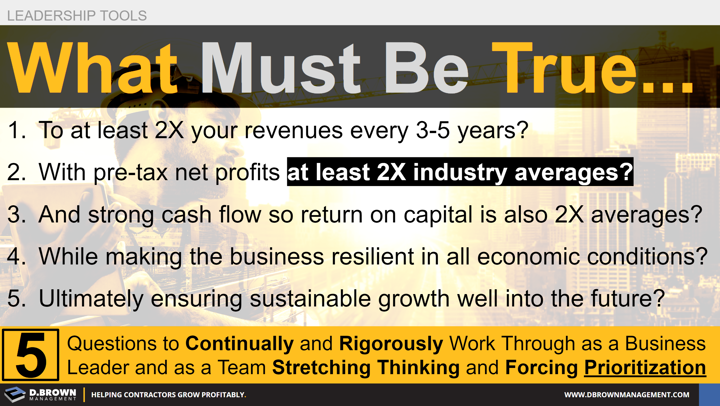Daily operational management is about adapting to what is currently true. Effective executive leadership sets a clear vision, including clearly knowing what must be true and then creatively bridging the gap between the two by integrating all levels.
Roger Martin describes this difference in thinking very well in the HBR Article and Webinar: The Big Lie of Strategic Planning
As contractors, we are all heavily focused on planning and executing so "Strategic Planning" sessions mostly become "strategic PLANNING" sessions.
A more effective approach is to break these into separate sessions and involving different mixes of people:
Dreaming - Set the vision and make it so big it's "Uncomfortably Exciting"
Prerequisites - What must be true internally and externally to achieve that dream
Current-State - Be rigorous and intellectually honest with yourselves as you look at your current team, capabilities, capital, reputation, execution ability, etc.
Strategies - Bridging the gaps between current state and your dream, focusing on directionality and major items.
Planning - Turning strategies into milestones, timelines, budgets, action items, etc. These plans must be prioritized effectively based on what will have the highest value-add to the business.
Execution Accountability - The operating rhythms that ensure plans stay on track and are adjusted as needed based on changing conditions.
While these questions may seem like they are financially focused, the truth is that to answer them effectively you must think rigorously about every element of your scoreboard, including market strategy and talent development.
What must be true...
- To at least double your revenues every 3-5 years?
- With pre-tax operating profits at least twice industry averages?
- And strong cash flow so your return on capital is also at least double industry averages?
- While making the business resilient in all economic conditions?
- Ultimately ensuring sustainable growth well into the future?
Within each of these major questions there are dozens of other questions that come up.
There are hundreds of examples within your company, the construction industry, and beyond that can help the team make connections.
Working through this will feel like being inside a rock tumbler for a while. It's grinding. It's noisy. It's painful. But if you stay at it long enough, you will come out the other side with beautifully polished rocks. You, your team, and your company will be stronger.
While you should be asking these questions regularly, it is even more important to ask these questions at critical inflection points like COVID-19 and the likely recession that will follow.
Facilitating your team through these questions can benefit from an unbiased and experienced 3rd party. This brings an outside perspective and allows you to participate in the discussions with your team, rather than having to focus on running the meeting.
There are many great facilitators out there. Choose one where their experience and approach aligns best with your team.

